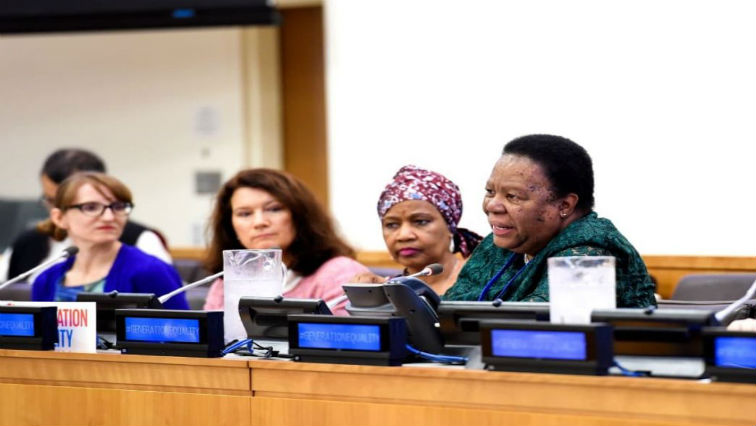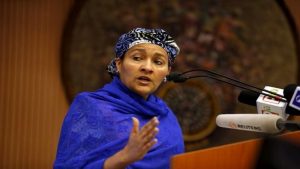Minister of International Relations, Naledi Pandor has called for clear incentives to be provided to countries that deliver on gender equality and women’s empowerment.
In a fiery speech at the United Nations during an event to galvanise ambition ahead of the 25th anniversary of the Beijing Platform of Action in 2020, Minister Pandor said countries who do not give women senior roles in their decision-making structures should not have a seat at the table among those who are.
It was an occasion to spur countries into action, almost a quarter of a century after that landmark women’s world conference in China in 1995.
While there has been progress, the pace has been slow and the growing frustration is palpable.
Pandor says, “I do feel a sense of sadness as I stand here and talk of these matters given my own countries poor record on femicide and gender-based violence and as we deliberate I ask myself, what are we going to do different from today and how do we ensure as institutions such as this one that those who sit at this high table and give the undertakings we all giving today deserve to be at this high table.”
“What will the measure be to decide who will sit here when we report on whether we have made progress or not. I think we need to set some incentives that will help us determine who will sit here. If we don’t have 50% in a legislature a country must not be here if women are not represented,” She says.
Pandor argued that if it was made too easy for countries to articulate a perspective in fora like the one she participated in, it would be too easy to neglect the gender equality agenda as a whole.
She called for monitoring and evaluation on progress countries were making, arguing that it was vital for them to be firm and not to rest. Calling for women to mobilise in their various countries and regions and ensure that international instruments are respected and observed in practice.
The minister says, “Our success will be measured by ensuring that women play a role in governance, that women are represented in public life. Those women are economically empowered, that women enjoy financial inclusion. That agriculture is modernised. Those women have access not just to land but to its ownership, that women have access not just to technology but to its innovation. That women have access not just to markets but to their control. That women have access not just to infrastructure but to owning it. That women have access to capital and make use of it. All of these are matters that we must address. “
Pandor also pointed to legislation as a tool. She says, “What should we do differently to ensure generational equality means real change. Women’s empowerment has to be enshrined in law. These laws should set out equal social, political, and economic rights and I believe as our first democratically elected president Nelson Mandela believed that the first of these laws must be the right to compulsory education, for all children boys and equally girls. Without that law enshrined in statute we won’t make that progress we are discussing today.”
For her part, the Executive Director of UN Women Dr Phumzile Mlambo-Ngcuka told the same gathering that there was a special place in hell for those who have the means to advance gender equality but refuse to do so.
[WATCH]: Min @NalediPandor speaking at the #UNSC meeting on “Cooperation between the United Nations & regional & sub-regional organizations in maintaining international peace & security”, at the Security Council Chambers, @UN, New York 25/09/2019 #SAatUNSC https://t.co/oSurpnOHGI
— DIRCO South Africa (@DIRCO_ZA) September 25, 2019






